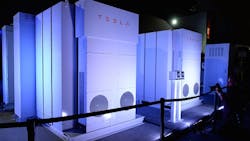Tesla just won a bid to supply grid-scale power in Southern California to help prevent electricity shortages following the biggest natural gas leak in U.S. history. The Powerpacks, worth tens of millions of dollars, will be operational in record time—by the end of this year.
Tesla Motors Inc. will supply 20 megawatts of energy storage to Southern California Edison as part of a wider effort to prevent blackouts by replacing fossil-fuel electricity generation with lithium-ion batteries. Tesla's contribution is enough to power about 2,500 homes for a full day, the company said in a blog post on Thursday, but the real significance of the deal is the speed with which lithium-ion battery packs are being deployed.
"The storage is being procured in a record time frame," months instead of years, said Yayoi Sekine, a battery analyst at Bloomberg New Energy Finance. "It highlights the maturity of advanced technologies like energy storage to be contracted as a reliable resource in an emergency situation."
The deal fits into Tesla Chief Executive Officer Elon Musk's long-term vision of transforming Tesla from an an electric car company to a clean energy company. That's the same motivation behind his pending deal to acquire SolarCity Corp., the rooftop solar company founded by his cousins, of which he is also chairman and the largest shareholder.
A 2-megawatt Tesla battery system costs about $2.9 million, according to Tesla's website. The company negotiates contracts greater than 2.5 megawatts, and a spokeswoman declined to comment on the value of this 20-megawatt deal.
Last fall's natural gas leak at Alisa Canyon near the Los Angeles neighborhood of Porter Ranch released thousands of tons of methane before it was sealed in February; in its wake, SCE and other utilities are pursuing energy storage deals. To alleviate the risk of blackouts, regulators ordered the installation of systems to store electricity when demand is low and deploy it when usage spikes, especially during the winter heating season.
Although Sempra Energy plugged its massive gas leak in February, use of its Aliso Canyon complex, California’s biggest gas storage field, remains restricted. Grid-storage projects are now being fast-tracked and are being built in less than four months, compared to an average of three and a half years in previous procurements, according to data compiled by Bloomberg New Energy Finance.
In August, California regulators approved two contracts for AES Corp. to build 37 megawatts of grid-scale energy storage systems to address anticipated power shortfalls stemming from the Aliso Canyon leak.
"This isn’t a Tesla-only story," Sekine said. "This is a broader energy win."
About the Author
Bloomberg
Licensed content from Bloomberg, copyright 2016.
